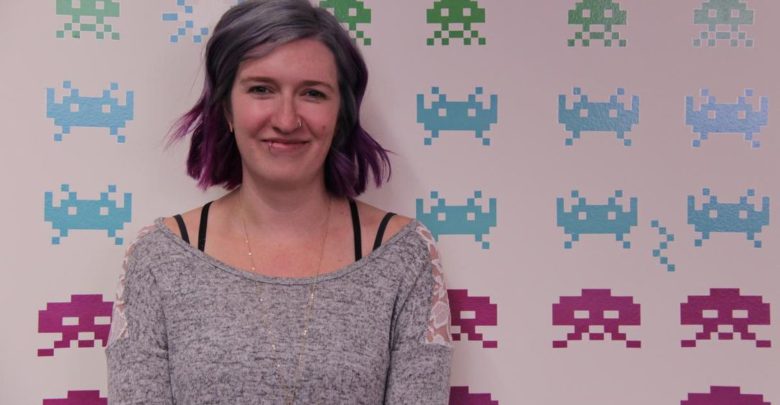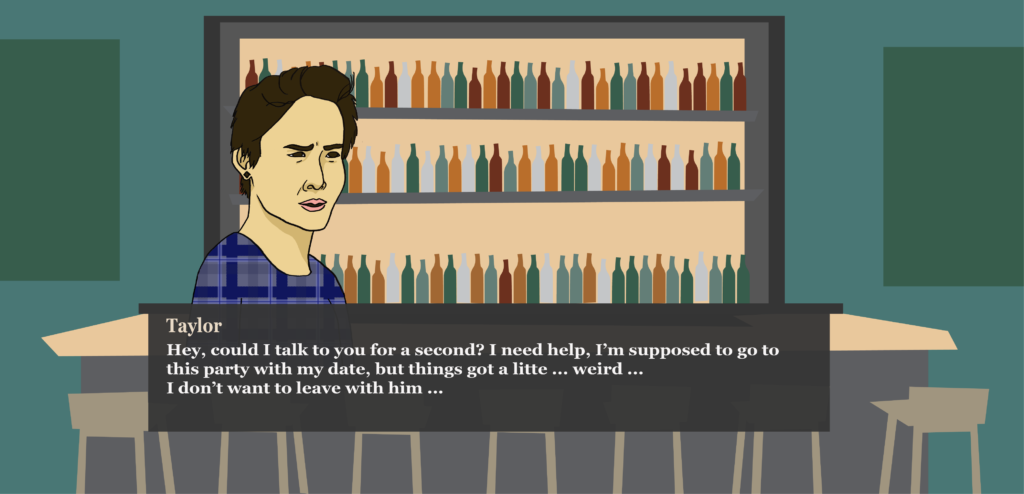Interactive video game reinforces violence-prevention training among bar staff
It's Your Move teaches invaluable lessons by gamifying violence-prevention training
 Supplied
SuppliedThe field of violence-prevention isn’t just serious, but it is often difficult to learn about. The learning curve can be steep and unrealistic, however, one University of Alberta student is looking to improve violence-prevention training by changing the way that we think about it.
Kenzie Gordon is a PhD student in digital humanities and media cultural studies at the University of Alberta. Gordon has created a new nightlife staff training video game called It’s Your Move in hopes of revolutionizing the way staff prepare for uncomfortable situations and hopefully produce better outcomes. The game is currently being used by multiple establishments across the Edmonton area, including the Sexual Assault Centre of Edmonton and the University of Alberta Sexual Assault Centre.
The Gateway was able to speak with Gordon regarding her unique approach to violence-prevention, the inspiration behind the video game, and her visions for the future of violence-prevention training among bar staff.
Responses were edited for brevity and clarity.
How did you first get involved with violence-prevention?
I did a placement when I was doing my bachelor degree in social work at the Family Violence Prevention Unit with the city of Edmonton. I hadn’t really known what sort of social work I wanted to do up to that point, but I got hooked on it after that point and realized, “Yup! This is where I want to be.” From there, I did a placement with the women’s shelter when I was studying abroad. Then I worked in domestic violence outreach once I finished school.
Is there anything specific that drives you regarding the issue of sexual assault?
As I became more familiar with feminist theories and understanding how gender-based violence is connected to larger structures of oppression in society, it highlighted how important of an issue it is to me. This isn’t just in terms of sexual violence and domestic abuse, but more as the tip of the iceberg in terms of representing the types of issues following gender-based oppression in our society.
What sets your program apart from others is that it is in the form of a video game. Do you think this format is better than traditional training for bar staff?
I wouldn’t say that it’s better, but I would say that it’s different. The video game is part of a traditional in-person training program, the 5 Minute Friend Bystander Training Program for nightlife staff in Edmonton. What the game adds is that it takes the place of roleplay in the training. It is an opportunity to have some hands-on experience and have an opportunity to practice the skills you’ve learned in the training in a more realistic setting than if you’re in a roleplay scenario.
Games can provide a really great opportunity to have a response system that can give you real time feedback and push you to practice your skills in a safe environment where no one will get hurt if you do the wrong thing.

It seems like the game has been a total success so far. What kind of feedback have you gotten from bartenders, managers and other bar staff who are using the game?
I think people who take the training appreciate it because a game is a little more novel and fun than a traditional training situation. But I think it’s also because it’s fast-paced and they have to bounce from scenario to scenario, which feels more like what a shift is like in the nightlife industry. It feels more realistic.
I think people appreciate that it gives them an opportunity to say, okay how would I actually do this at work? The feedback has been that it’s helpful to be pushed to act more like the real world.
Were there any personal or professional challenges that you experienced while developing the game? It seems like a lot of thought was put into it.
There was a technical learning curve for me. This is the first game with visuals I’ve ever made. I think the challenging part was developing scenarios that people could relate to and dialogue that seemed realistic and didn’t seem stilted. The goal was to develop something that was really representative of the values of the agencies that it serves, but also so that it wasn’t a boring, corporate training video. It’s kind of a hard balance to strike.
I’m glad it worked to create something so powerful. Just to finish up, what do you see for the future of It’s Your Move and how you might want to continue your work in violence-prevention?
I think that there is a huge amount of opportunity for the development of games in violence-prevention. That’s actually what my dissertation research is on, what opportunities and importances do video games open for violence-prevention work. I think if it’s used in an intentional manner, the possibilities are pretty much endless, as it’s the most popular media format of our era and up to this point it’s been really under-utilized. I’m really excited to see all the different directions it goes.




